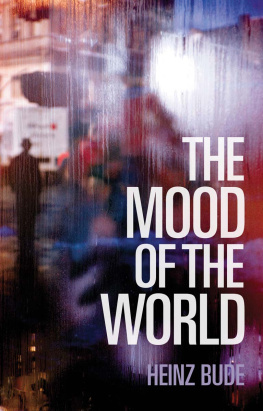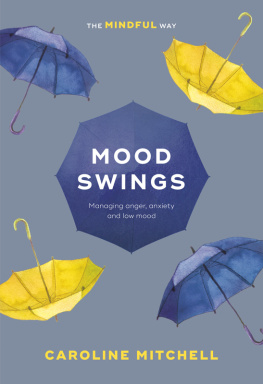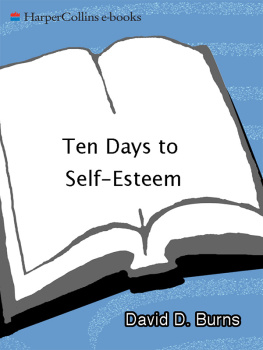Contents
Guide
Pages

It is as though his eyes had no lids.
Hugo von Hofmannsthal
The Mood of the World
Heinz Bude
Translated by Simon Garnett
polity
First published in German as Das Gefhl der Welt. ber die Macht von Stimmungen Carl Hanser Verlag, Munich, 2016
This English edition Polity Press, 2018
Polity Press
65 Bridge Street
Cambridge CB2 1UR, UK
Polity Press
101 Station Landing
Suite 300
Medford, MA 02155, USA
All rights reserved. Except for the quotation of short passages for the purpose of criticism and review, no part of this publication may be reproduced, stored in a retrieval system or transmitted, in any form or by any means, electronic, mechanical, photocopying, recording or otherwise, without the prior permission of the publisher.
ISBN-13: 978-1-5095-1997-2
A catalogue record for this book is available from the British Library.
Library of Congress Cataloging-in-Publication Data
Names: Bude, Heinz, author.
Title: The mood of the world / Heinz Bude.
Other titles: Gefhl der Welt. English
Description: Cambridge, UK ; Medford, MA : Polity Press, [2018] | Translation of: Gefhl der Welt : ber die Macht von Stimmungen. | Includes bibliographical references and index.
Identifiers: LCCN 2018004123 (print) | LCCN 2018020354 (ebook) | ISBN 9781509519972 (Epub) | ISBN 9781509519934 (hardback) | ISBN
9781509519941 (pbk.)
Subjects: LCSH: Mood (Psychology)--Social aspects. | Emotions--Sociological aspects.
Classification: LCC BF521 (ebook) | LCC BF521 .B83 2018 (print) | DDC 155.5/124--dc23LC record available at https://lccn.loc.gov/2018004123
The publisher has used its best endeavours to ensure that the URLs for external websites referred to in this book are correct and active at the time of going to press. However, the publisher has no responsibility for the websites and can make no guarantee that a site will remain live or that the content is or will remain appropriate.
Every effort has been made to trace all copyright holders, but if any have been inadvertently overlooked the publisher will be pleased to include any necessary credits in any subsequent reprint or edition.
For further information on Polity, visit our website: politybooks.com
Preface
Explaining the power of mood confronts sociology with its popular image. The sociological perspective is supposed to reveal ulterior causes and processes: how the popular press manipulates the public mood, the alienating effects of the neoliberal dictate of positivity, how the scandalous facts of increasing social division are suppressed by the feeling that there is no alternative. This book will disappoint any such expectations of sociological explanation.
Mood is not the opium of the people. Moods form a reality of their own and cannot be understood solely as the reaction to biographical circumstances and systemic conditions. While the events of 2008 showed how moods influence events on the financial markets, it has always been assumed that shifts in public mood are responsible for political shifts. It is also abundantly clear just how far our consumer behaviour is dependent on mood. Moods have fundamental significance in a literal sense, in that they convey to us a feeling of the world. Depending on my mood, I am capable of anything or nothing. This goes not only for individuals, but also or groups, collectives and societies as a whole.
The sociology of mood is thus as fundamental as mood itself. Perhaps more than the sociology of media, the sociology of finance or the sociology of sexuality, it has to do with the social existence which determines our consciousness.
The fifth volume of Karl Ove Knausgrds monumental autobiography My Struggle begins with the words:
The fourteen years I lived in Bergen, from 1988 to 2002, are long gone, no traces of them are left other than as incidents a few people might remember, a flash of recollection here, a flash of recollection there, and of course whatever exists in my own memory of that time. But there is surprisingly little. All that is left of the thousands of days I spent in that small, narrow-streeted, rain-shimmering Vestland town is a few events and lots of sentiments.
Note
. Karl Ove Knausgaard (2016),
Some Rain Must Fall: My Struggle Book 5, trans. Don Bartlett, London: Vintage.
How We Are, and How We Are Faring
Have all the melodies of world improvement been played? Does the possibility of the whole appear faint at best? Amidst it all, has the self grown weary of itself? Today, anyone claiming that all truths are relative and that nothing can be trusted is preaching to the converted. Yet the applause is hesitant because many nurture the silent hope that perhaps there is something to believe in after all. That a beginning is possible, despite the complexity of social relations in a world without limits.
Let us not be deceived: the public is watchful and informed enough to know the game of intellectual critique, in which good news about economic growth and job creation is turned into bad news about global warming and the burn-out of the workforce. People dont turn a blind eye to contradictory developments in society and their ambiguous consequences for the individual. Yet intellectual cleverness is considered suspect when it leads to nothing. It appears we have reached the end of a period of perhaps thirty years that many well-known diagnoses of the present see as the grand finale to a longer process of decline. The end of capitalism has again become conceivable; that has no equivalent in the millions of years of Earths history. Yet outrage that the world as we know it has been allowed to self-destruct merely conceals fear about not knowing where to go next.
The mood of our situation can be defined by looking at two complexes. The first is rootless anti-capitalism. It can be found among skilled autoworkers with union membership cards, At my workplace, in our family, among us locals the world is in order but outside, predatory capitalism rages, tearing everything to pieces and holding nothing sacred. We will probably be all right. But how our children will manage, heaven only knows.
Anti-capitalists of all classes and nations see the reason for the ubiquitous imperialism of disorganization in the politically willed and driven transformation of what is now barefaced capitalism. Neoliberalism is the name for a cult of the strong self, one that demands the sacrifice of social community, care for the weak and the collective property of the welfare state. The ideological armies that came to power with Ronald Reagan, Margaret Thatcher and Deng Xiaoping at the end of the 1970s replaced the social market economy with the ownership society. Only when society served the economy, so the neoliberal credo goes, could the economy serve society. Although they knew the dangers, political majorities worldwide subscribed to this reversal of social relations.
The results are visible today. What is positive about the fact that income inequality in the United States has reverted to levels last seen a century ago? Having lost its counterpart after the collapse of socialism, capitalism now lacks all restraints. Lunch is for losers is the motto of the capitalist ideal of relentless competition and wholesale social desolation. The conventions of the good life have been swept away by a regime of total mobilization. Sleep and you risk sleeping through whats new, stay awake and optimize your presence through yoga. All just to turn money into more money.
We saw where this mania of extended and accelerated self-exploitation leads to in 2008. When capitalism finds its apotheosis in a financial industry compliant only with the profit demands of a class of monetary asset holders, then the floodgates are open for the financialization of the world. covering the risks of others who, relying on us to repay our debts, placed mad bets on an uncertain future.










